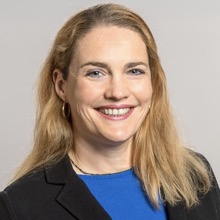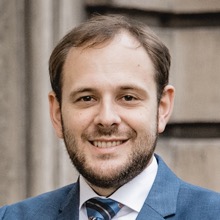WI2023 – Track: Digital Infrastructure, Internet of Things & CPS
Track description
The track “Digital Infrastructure, Internet of Things & CPS” covers topics related to a wide variety of digital infrastructure technologies and the Internet of Things (IoT) as well as their use in the context of cyber-physical systems (CPS). The diverse ways in which said technologies can be deployed require competence, accountability, and sense of responsibility. Therefore, this track aims to bundle technical, managerial, organizational as well as societal issues of information systems in the said subject area.
In this context, digital infrastructures describe fundamental, strategic services that enable individuals, companies, but also governments to process and exchange data, execute processes and to operate application systems and information technology. They range from the Internet backbone to mobile and fixed broadband connections to data centers, cloud services, and edge devices. The digital infrastructure of the IoT is a substantial pillar of the fourth industrial revolution. CPS (“robots”) are described in this context as self-optimizing and reconfigurative systems whose capability goes beyond autonomous collection of local data. By integrating sensors and actuators into an overall digital system, CPS provide novel system functions for information, data, and function integration, enabling the development of networked, digital value networks such as smart factory and smart mobility.
Under the overarching conference theme of Digital Responsibility, this track also invites submissions that address issues related to sustainability of these systems. This includes the design and use of green information systems, infrastructures for processing IoT data, and systems for environmental monitoring.
In this context, questions arise about innovative business models, economic efficiency, sustainability, IT acceptance and IT adoption, which can be considered in relation to big data analytics incl. machine learning, IT architecture management, process integration, or information system engineering. Contributions to this track may use design-oriented and behavior-oriented methods from Information Systems and related disciplines.
Track Topics
- Theories, IT artifacts, and design principles for DI, IoT, and CPS.
- Case studies and implementation examples for DI, IoT, and CPS
- Empirical studies on DI, IoT, and CPS
- Methods for monitoring and controlling DI, IoT, and CPS
- Methods for evaluation and cost effectiveness of DI, IoT, and CPS
- Data governance and privacy in DI, IoT, and CPS
- Business process management and process mining for DI, IoT, and CPS
- Interaction with autonomous intelligent systems in DI, IoT, and CPS
- IT infrastructures for DI, IoT, and CPS
- Consideration of sustainability aspects in DI, IoT, and CPS
Track Chairs

Christian Janiesch
Technische Universität Dortmund
Christian Janiesch is Professor for Enterprise Computing at the Department of Computer Science at TU Dortmund University. Currently his key interests are applications of machine learning for business process management as well as efficacy and relevance of explainable artificial intelligence, for example in machine maintenance or production. He is on the BPM Department Editorial Board for Business & Information Systems Engineering as well as Editor for the Journal of Business Analytics and International Journal of Management Reviews. He regularly chairs tracks at the European Conference on Information Systems. He has authored over 150 scholarly publications. His work has appeared in journals such as the Journal of the Association for Information Systems, Communications of the Association for Information Systems, Information & Management, Business & Information Systems Engineering, Information Systems, Decision Support Systems, Future Generation Computer Systems as well as in various major international conferences including ICIS, ECIS, and BPM. He won the WI 2020 best paper award.

Stefanie Rinderle-Ma
Technische Universität München
Stefanie Rinderle-Ma is full professor at the Department of Informatics at the Technical University of Munich and head of the Chair of Information Systems and Business Process Management. Her research interests include flexible and distributed process technology, digitalized compliance management, as well as process and production intelligence. The goal is to enable and accelerate digitalization and automation through processes while at the same time keeping humans in the loop. Application areas comprise Industry 4.0, Internet of Processes and Things, logistics, and health care. Stefanie has more than 250 publications and an h-index of 48.

Dennis Riehle
Universität Koblenz-Landau
Dennis Riehle is junior professor and head of the research group Information Systems and Smart Data at the Institute for Information Systems Research at the University of Koblenz-Landau. He also leads the Enterprise-of-Things Lab, which focuses on novel technologies, information infrastructures, and the design, creation, and implementation of intelligent information systems with a focus on value-added use in organizations. Dennis Riehle is (co-)author of more than 30 scientific publications. His current research interests are in the field of Smart Data, especially data management and data analysis, as well as in the field of Internet-of-Things (IoT), especially data acquisition by sensors and processing in suitable IT infrastructures.
Associate Editors
- Stephan Aier, Universität St. Gallen
- Konrad Diwold, Technische Universität Graz
- Thomas Frühwirth, Technische Universität Wien
- Joschka Hüllmann, University of Twente
- Marcus Grum, Universität Potsdam
- Peter Loos, Universität des Saarlandes
- Thomas Ludwig, Universität Siegen
- Boris Otto, Technische Universität Dortmund / Fraunhofer ISST
- Daniel Ritter, SAP SE
- Ronny Seiger, Universität St. Gallen
- Florian Schwade, Universität Koblenz · Landau
- Stefan Tai, Technische Universität Berlin
- Christof Thim, Universität Potsdam
- Manuel Wimmer, Johannes Kepler Universität Linz
References
Boyes H et al. (2018). The industrial internet of things (IIoT): An analysis framework. Computer in Industry 101: 1-12.
Brendel AB et al (2022). Review of Design-Oriented Green Information Systems Research. Sustainability 14 (8): 4650.
Gubbi J et al. (2013). Internet of Things (IoT): a vision, architectural elements, and future directions. Future Generation Computer Systems 29 (7): 1645-1660.
Janiesch C et al. (2019). Specifying Autonomy in the Internet of Things: The Autonomy Model and Notation. Information Systems and e-Business Management 17 (1): 159-194.
Janiesch C et al. (2021). The Internet of Things Meets Business Process Management: A Manifesto. IEEE Systems, Man, and Cybernetics Magazine 6 (4): 34-44.
Henfridsson O, Bygstad B (2013). The Generative Mechanisms of Digital Infrastructure Evolution. MIS Quarterly 67 (3): 907-931.
Liu C et al. (2020). Data Quality and the Internet of Things. Computing 102 (2): 573-599.
Mangat AS et al. (2021). Interactive Process Automation based on Lightweight Object Detection in Manufacturing Processes. Computers in Industry 130: 103482.
Nitschke, P & Williams SP (2021). Conceptualizing the Internet of Things Data Supply. Proceedings of CENTERIS 2021: 642-649.
Stertz F et al. (2020). Analyzing Process Concept Drifts Based on Sensor Event Streams During Runtime. Proceedings of BPM 2020: 202-219.
Sunyeav A (2020). Internet Computing: Principles of Distributed Systems and Emerging Internet-Based Technologies. Springer.
Wanner J et al. (2020). Machine Learning and Complex Event Processing: A Review of Real-time Data Analytics for the Industrial Internet of Things. Enterprise Modeling and Information Systems Architectures 15 (1): 1-27.
Williams SP et al. (2019). Configuring the Internet of Things (IoT): A Review and Implications for Big Data Analytics. Proceedings of HICSS 2019: 5848-5857.
